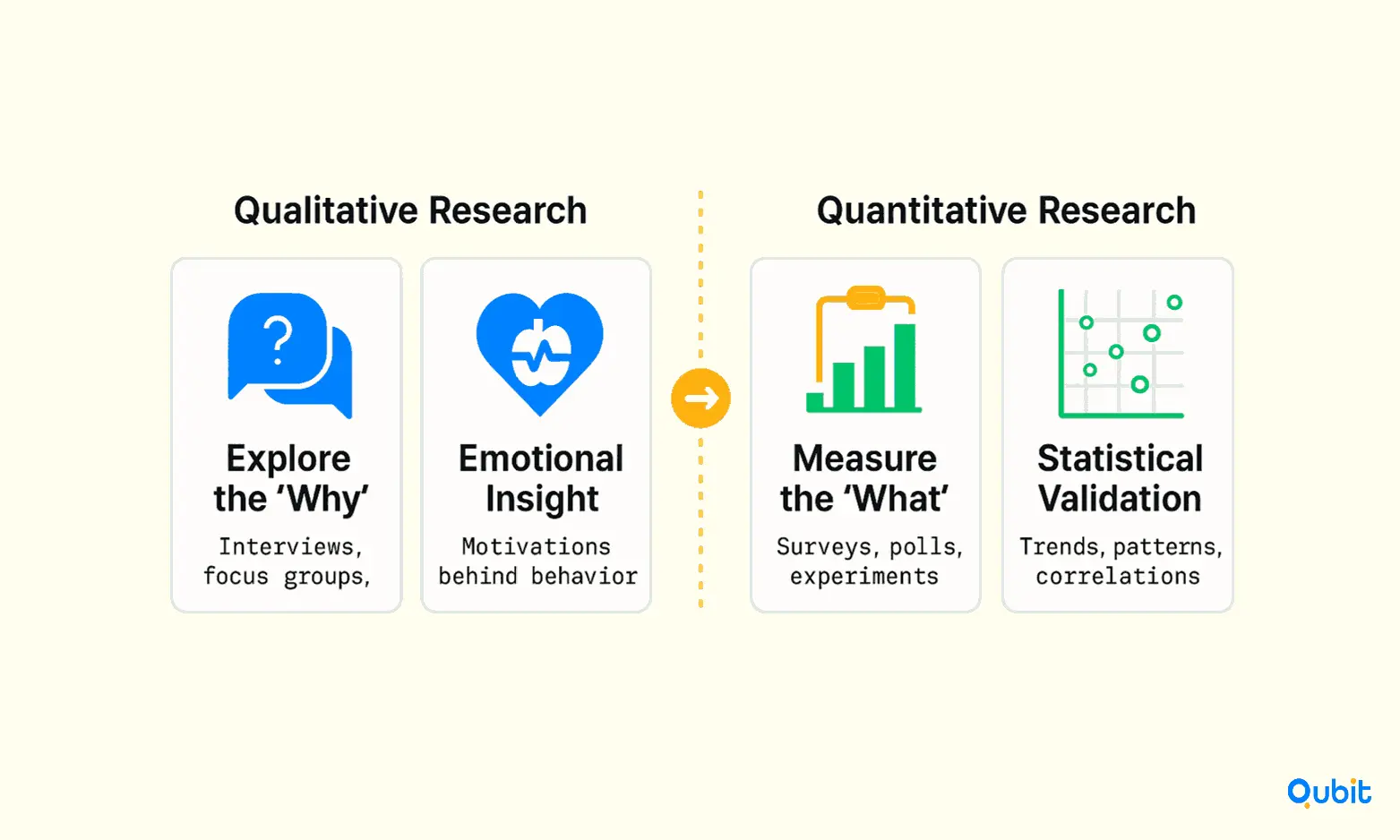Understanding market dynamics is essential for businesses aiming to thrive in competitive environments. Market research and trend analysis provide the foundation for informed decision-making, enabling companies to identify opportunities, mitigate risks, and adapt to evolving consumer needs. This blog explores how startups and investors can harness these methodologies to gain actionable insights and stay ahead of the curve.
The discussion connects directly to startup scouting strategies, offering you a comprehensive context that bridges detailed market research with a wider framework for early-stage startup evaluations. Whether you're selecting tools or analyzing trends, this guide will equip you with practical approaches to navigate the complexities of modern markets.
Let’s jump right in!
Understanding Market Research Methods
Market research serves as the backbone of informed business decision-making. It is a systematic process of gathering, analyzing, and interpreting data about consumers, competitors, and market trends. By understanding these elements, businesses can identify opportunities, mitigate risks, and refine strategies to meet market demands effectively.

Qualitative vs. Quantitative Approaches
Market research methods can be broadly categorized into qualitative and quantitative approaches, each offering unique insights.
Qualitative Research: This method focuses on understanding consumer behavior and motivations through open-ended techniques like interviews, focus groups, and observational studies. It provides nuanced insights into why consumers make certain choices, helping businesses tailor their messaging and product offerings.
Quantitative Research: In contrast, quantitative methods rely on numerical data collected through surveys, polls, and experiments. These techniques yield statistically measurable results, enabling businesses to identify patterns, trends, and correlations within their target audience.
Both approaches are complementary, with qualitative research offering depth and context, while quantitative research provides breadth and statistical reliability.
Primary vs. Secondary Research
Another distinction in market research lies between primary and secondary research.
Primary Research: This involves collecting original data directly from sources, such as customer surveys, interviews, or experiments. It is tailored to specific business needs, ensuring relevance and accuracy.
Secondary Research: Secondary research uses pre-existing data, such as industry reports, government statistics, or competitor analysis. It is cost-effective and provides a broader context to complement primary findings.
Combining both methods often results in a more holistic understanding of the market landscape. For example, research findings from Grand View Research highlight the rapid increase in marketing analytics investments, showcasing the importance of secondary data in identifying industry trends.
The Growing Importance of Market Analytics
The investment in market analytics is expanding at an unprecedented rate, creating vast opportunities for startups and established businesses alike. According to projections from ResearchAndMarkets.com, the US marketing analytics market is expected to surge significantly in the coming years it is tend to grow from 5.25 billion in 2025 to USD 9.56 billion by 2030. This growth underscores the critical role of data-driven insights in shaping business strategies and staying competitive.
Understanding market research methods is essential for businesses aiming to thrive in dynamic environments. By leveraging qualitative and quantitative techniques, alongside primary and secondary research, companies can build a robust foundation for decision-making and innovation.
Value of Market Research for Startups
Market research is a cornerstone for startups aiming to build sustainable businesses. It offers critical insights that validate ideas, refine strategies, and optimize decision-making processes. By understanding market dynamics, startups can confidently shape their offerings and reduce uncertainties.
Validating Concepts and Forecasting Success
Market research enables startups to test their ideas before committing resources. Through surveys, focus groups, and competitor analysis, founders can gauge whether their product or service meets real-world needs. This validation not only saves time and money but also strengthens investor confidence. Data-driven forecasts, backed by market research, often resonate more with investors and lenders than assumptions, making it easier to secure funding.
Profiling Customers for Targeted Strategies
Precise customer profiling is another advantage of market research. By identifying demographics, preferences, and purchasing behaviors, startups can tailor their marketing efforts to resonate with their audience. This targeted approach enhances industry positioning and boosts funding prospects, as investors are more likely to support ventures with a clear understanding of their market.
Optimizing Market Selection and Pricing
Choosing the right market and pricing strategy can make or break a startup. Market research provides insights into competitive landscapes, consumer willingness to pay, and regional demand. For example, incorporating competitive analysis for startup investing can help uncover unmet needs in the market, allowing startups to position themselves effectively.
Reducing Risks and Refining Strategies
Launching a startup involves inherent risks, but market research minimizes them by offering actionable data. It highlights potential pitfalls, identifies emerging trends, and provides a roadmap for strategic adjustments. This proactive approach ensures startups are better equipped to handle challenges and pivot when necessary.
Market research is not just a tool; it’s a necessity for startups seeking to thrive in competitive environments. By validating concepts, profiling customers, optimizing pricing, and reducing risks, it lays the groundwork for informed decision-making and long-term success.
Market Research Process and Strategies
A well-structured market research process is the cornerstone of transforming raw data into actionable insights. By following a systematic approach, businesses can ensure that their research efforts yield meaningful outcomes. This section outlines the key steps involved, from defining objectives to conducting a final debrief, while highlighting cost-effective strategies for startups and small businesses.
1. Define Clear Objectives
The foundation of any successful market research lies in setting clear, measurable objectives. These objectives act as a roadmap, guiding the research process and ensuring that every step aligns with the desired outcomes. For instance, a startup might aim to understand customer preferences for a new product or identify gaps in the market.
2. Choose the Right Research Methods
Selecting the appropriate research methods is crucial to gathering relevant data. Startups, in particular, can benefit from cost-effective tools such as A free tool for creating surveys like Google Forms. This platform simplifies data collection, allowing businesses to gather consumer feedback without incurring high costs.
3. Collect and Validate Data
Data collection is the heart of the research process. Whether through surveys, interviews, or secondary sources, ensuring the quality and reliability of data is paramount. Startups can also enhance their understanding of industry trends by consulting resources. This database offers sector-specific insights, helping businesses contextualize their findings within broader market trends.
4. Analyze and Interpret Findings
Once data is collected, the next step is to analyze and interpret the results. This involves identifying patterns, trends, and anomalies that can inform decision-making. For instance, if customer feedback reveals a consistent demand for a specific feature, businesses can prioritize its development.
5. Conduct a Final Debrief
The research process concludes with a comprehensive debrief. This step involves summarizing findings, discussing implications, and outlining actionable recommendations. A well-executed debrief ensures that all stakeholders are aligned and ready to implement the insights gained.
Cost-Effective Strategies for Startups
Startups often operate with limited budgets, making it essential to prioritize cost-effective research methods. Utilizing free or low-cost tools, tapping into existing industry reports, and directly engaging with customers are practical strategies. Additionally, businesses can track startup funding news to stay informed about market trends and investor signals, which can complement their research efforts.
By following these steps and strategies, businesses can transform raw data into actionable insights, paving the way for informed decision-making and sustainable growth.
Effective Market Research Tools and Trend Analysis
Understanding your market is the cornerstone of any successful startup. With the right tools, startups can gather critical insights, analyze competitors, and predict trends to make informed decisions. This section explores a range of market research tools designed to assist startups in every phase of their journey, from data collection to trend analysis.
Tools for Data Collection and Customer Insights
Gathering accurate data is the first step in understanding your audience and market. Several tools make this process seamless and efficient:
- SurveyMonkey: Known for its intuitive dashboards, SurveyMonkey allows startups to create surveys, collect responses, and analyze feedback. For instance, it can be integrated to quickly gather targeted consumer opinions, making it ideal for startups looking to refine their product offerings.
- Google Forms: A free and straightforward solution, Google Forms is perfect for running quick surveys or capturing respondent data. It’s especially useful for early-stage market validation with minimal overhead.
- Tally: This minimalist form creation tool is designed for startups seeking direct customer feedback. Tally helps gather short, frictionless responses from users, making it a great choice for startups with limited resources.
Competitor Analysis Tools
Understanding your competitors is just as important as knowing your customers. These tools help startups analyze competitor strategies and identify opportunities:
- SEMrush: This platform provides insights into competitor SEO, paid ads, and overall digital presence. For example, SEMrush can uncover high-performing competitor keywords, enabling startups to optimize their content strategy effectively.
- SimilarWeb: With SimilarWeb, startups can check competitor traffic sources, audience demographics, and engagement metrics. Use it to benchmark your startup’s online traffic against competitors and identify areas for improvement.
- Crayon: Crayon monitors competitor pricing, product updates, and reviews, offering AI-driven insights. It’s particularly useful for tracking subtle shifts in competitor offerings or positioning.
Tools for Trend Tracking
Staying ahead of market trends is crucial for startups aiming to remain competitive. These tools provide real-time insights into emerging patterns:
- Google Trends: This tool tracks real-time search volumes and interest over time for various keywords. Google Trends helps identify seasonal demand fluctuations or emerging consumer interests, allowing startups to adjust their strategies accordingly.
- AnswerThePublic: By visualizing questions people ask on search engines, AnswerThePublic generates topic ideas and queries around consumer search behaviors. This tool is invaluable for guiding content strategy and understanding what your audience is curious about.
AI-Powered Research Tools
Artificial intelligence is revolutionizing market research by offering deeper insights and predictive capabilities:
- Qualtrics X: This platform uses AI to analyze consumer feedback and includes predictive modeling features. Qualtrics X can anticipate future consumer behavior, helping startups make data-driven decisions.
- Brandwatch: By analyzing social media discussions, Brandwatch provides insights into brand sentiment and trending topics. It’s an excellent tool for identifying potential brand crises or opportunities for engagement.
- ChatGPT: Beyond generating survey questions, ChatGPT can organize feedback and brainstorm strategies using its AI language capabilities. For example, it can draft well-structured questionnaire items and explore data insights quickly, saving startups valuable time.
Comprehensive Market Data Platforms
For startups needing extensive market data and industry reports, platforms like Statista are invaluable. Statista offers a plethora of ready-made charts, studies, and infographics across multiple industries, making it a go-to resource for in-depth research.
Why These Tools Matter
The effective use of these tools can streamline insights, improve forecasting, and enhance strategic planning. Whether you’re a startup with a tight budget or one ready to invest in premium solutions, there’s a tool for every need. By combining data collection, competitor analysis, and trend tracking, startups can position themselves for long-term success.
Optimizing Market Research Budgets
Market research costs can vary significantly, often ranging from $3,000 to $15,000 for basic studies. Understanding these variations is essential for businesses aiming to allocate their budgets effectively. Whether you're a bootstrapped startup or an established company, tailoring your approach to fit financial constraints can make all the difference.
Budgeting for Reliable Data
Investing in expert-driven market research may seem costly upfront, but it often delivers a stronger return on investment (ROI). Higher initial spending ensures access to reliable data and professional analysis, which can guide critical business decisions. For instance, setting a realistic research budget can help startups measure ROI effectively, ensuring that every dollar spent contributes to actionable insights.
Creative Solutions for Limited Budgets
Startups operating on tight budgets often turn to free tools and creative planning to maximize their resources. Platforms offering basic analytics or free survey tools can provide valuable data without significant financial outlay. However, these options may lack the depth and accuracy of professional research, making them better suited for preliminary insights rather than comprehensive strategies.
The Role of Specialized Tools
For businesses seeking advanced solutions, specialized tools like AI-driven platforms can refine market research processes. An exploration of data platforms for startup scouting demonstrates how advanced analytical tools complement traditional market research, refining your process of identifying high-growth startup opportunities. These platforms can be particularly useful for companies looking to optimize their budgets while maintaining high-quality data standards.
Real-World Market Research Case Studies
Startups often achieve remarkable milestones by applying market research tools to refine their strategies. This section highlights real-world examples where startups used data-driven insights to fuel growth, enhance customer engagement, and secure funding.
Parade: Spotting Trends with Google Trends
The direct-to-consumer (DTC) underwear brand Parade demonstrated how search data can uncover untapped opportunities. By analyzing search patterns on Google Trends, the company identified a growing interest in eco-friendly underwear. This insight led to the successful launch of a sustainable product line in 2025, which resonated with environmentally conscious consumers. The ability to align product development with emerging trends proved instrumental in Parade’s market success.
ClickUp: Boosting Visibility with SEMrush
ClickUp, a SaaS startup, turned to SEMrush to refine its SEO strategy. By analyzing competitor keyword data, the company identified high-impact opportunities to improve its organic search rankings. Within just three months, this approach resulted in a 50% increase in organic traffic. ClickUp’s experience underscores the importance of competitive analysis in driving measurable growth through improved online visibility.
Chime: Enhancing Customer Loyalty with Qualtrics
Chime, a fintech startup, focused on customer retention by utilizing survey data from Qualtrics. Through Net Promoter Score (NPS) surveys and sentiment analysis, the company identified key areas for improvement in its customer experience. These actionable insights led to an 18% reduction in churn by 2025, showcasing how understanding customer sentiment can directly impact loyalty and retention.
Miro: Validating Market Potential with Statista
Miro, another SaaS startup, used Statista’s industry statistics to validate its market potential. This data-driven approach not only confirmed the demand for its product but also played a pivotal role in attracting investors. By presenting robust market sizing data, Miro secured a $400 million funding round in 2025, demonstrating how market validation can build investor confidence.
These case studies illustrate how startups can use tools like Google Trends, SEMrush, Qualtrics, and Statista to make informed decisions. Whether it’s identifying trends, refining marketing strategies, or validating market potential, data-driven approaches consistently translate into tangible results.
Conclusion
Effective market research is the cornerstone of informed decision-making for startups. By employing robust methodologies, leveraging advanced tools, and focusing on cost optimization, businesses can uncover valuable insights that drive growth. This data-driven approach not only minimizes risks but also enhances the ability to attract investors by showcasing a well-researched and scalable business model.
Startups that integrate actionable research strategies into their operations position themselves for long-term success. These strategies ensure that every decision is backed by evidence, reducing uncertainty and fostering confidence among stakeholders.
If you're ready to turn research insights into successful funding rounds, we invite you to explore our Fundraising Assistance service. Let us help you transform your market research into tangible results that fuel your startup's growth.
Key Takeaways
- Market research is vital for startups to validate ideas, tailor strategies, and reduce risks.
- A structured process, from defining objectives to debrief, ensures actionable insights.
- Using a mix of free and advanced tools facilitates comprehensive market analysis.
- Effective budgeting and expert investment can maximize ROI.
- Real-world case studies demonstrate the transformative impact of data-driven research.
Frequently asked Questions
What are the best market analysis tools for startups?
Tools like Google Trends, SEMrush, and Qualtrics are highly effective, offering detailed insights and data-driven analytics.






